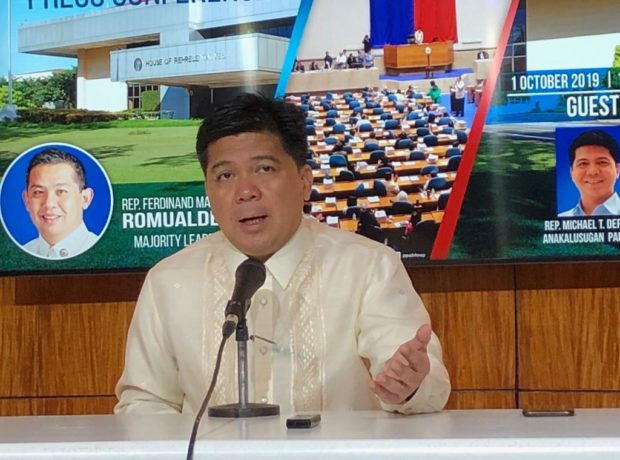Private firms, coops in power sector owe gov’t nearly P100B

Anakalusugan Rep. Mike Defensor during the weekly briefing at the House of Representatives. (File photo by NOY MORCOSO / INQUIRER.net)
Updated @ 8:58 p.m., Feb. 19, 2020
MANILA, Philippines — The government still has overdue receivables of over P95 billion from private corporations and cooperatives in the power sector, two lawmakers said Wednesday.
In a press briefing, Anakalusugan Rep. Michael Defensor and Bulacan Rep. Jose Antonio Sy-Alvarado said the Power Sector Assets and Liabilities Management Corp. (PSALM) still has the following uncollected fees from private corporations and cooperatives:
- Power and Universal Charges (UC) – P35.44 billion
- Independent Power Producer Administrator (IPPA) – P33.62 billion
- Others – P26.35 billion
Defensor is the chair of the House committee on public accounts while Sy-Alvarado is the chair of the House committee on good government and public accountability.
According to records shared by the lawmakers, the uncollected power and universal charges come from electric cooperatives, distribution utilities, and ecozones, among others.
Article continues after this advertisementMeanwhile, overdue receivables from IPPA are from the following:
Article continues after this advertisement- South Premiere Power Corp. – P23.94 billion)
- Northern Renewables Generation Corp. – P4.47 billion
- FDC Misamis Power Corp. – P2.63 billion
- FDC Utilities, Inc. – P1.16 billion
- Good Friends Hydro Resources Corp. – P1.21 billion
- Waterfront Mactan Casino Hotel, Inc. – P87.74 million
Defensor, who chairs the House Committee on Public Accounts, said these firms would be asked to attend the committee’s next hearing.
“When the President got angry over the water problem, the amount involved was only P11 billion. He got angry because this will affect our countrymen who are paying for the cost of water,” Defensor said in Filipino.
PSALM also has receivables from the Manila Electric Co. (Meralco) amounting to P14.97 billion, but Defensor said the power company had agreed to settle its fees.
“We are calling on the company to settle the amount even before the hearing. Pay for it because it’s not the government that will pay for it. In the end, it’s the people who will pay,” he said.
Approaching expiration
Sy-Alvarado said that PSALM, which is tasked with handling government receivables from the power sector, would expire in 2026.
“What the mentioned companies are doing is that they are suing the government,” Sy-Alvarado said. “In other words, if you want to put one over the government, don’t pay. File a case and put PSALM under litigation. And then just let the people pay.”
PSALM may be extended, but it requires the passage of a new law. The priority remains to be the collection of the unsettled receivables.
But the overdue receivables might actually be larger, Defensor said.
The lawmaker said a report from the Commission on Audit (COA) shows that overdue receivables have reached around P150 billion.
Asked if the lawmakers would convey to the Palace their findings, Defensor said: “Yes, we will do [that].”